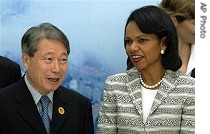2006年VOA标准英语-North Korea Nuclear Issue Overshadows APEC Meet(在线收听)
By Luis Ramirez
Hanoi
16 November 2006
U.S. Secretary of State Condoleezza Rice says the United States and its partners expect North Korea to return to nuclear disarmament talks only if it is ready to negotiate seriously. Secretary Rice and diplomats from other nations met on the sidelines of the Asia-Pacific Economic Cooperation forum.
-----
The subject of North Korea's October 9 nuclear test continued to overshadow meetings aimed at trying to break a deadlock in stalled world trade negotiations.
The United States and its partners in the six-party North Korea talks have been using the occasion of having five of the six nations in one place to plan the next round of negotiations - which North Korea has agreed to attend after a year-long boycott.
However, the United States and others have been skeptical that the North is ready to negotiate. Several rounds of talks since 2003 have yielded no concrete result. Furthermore, North Korea last year agreed to take steps to give up its nuclear programs in exchange for aid and other benefits, only to carry out a nuclear test last month.
After one of the meetings here at APEC Thursday, U.S. Secretary of State Condoleezza Rice told VOA the United States and other participants in the talks want to be sure that North Korea is ready to deal this time.
 Condoleezza Rice, right, chats with South Korean Acting Foreign Minister Yu Myung-hwan in Hanoi, Nov. 16, 2006 |
||
The U.N. Security Council unanimously adopted resolution 1718 in October after North Korea's nuclear test.
U.S. diplomats are due to meet with officials from China, the host of the nuclear talks, on Friday to talk about setting a date for them - probably in December.
Other participants in the talks are Japan, Russia, and South Korea - whose leaders will all be at the APEC summit.
Despite the attention given to North Korea, APEC organizers have tried to keep the focus on trade. Calls continued on Thursday for all sides to show flexibility in re-starting world trade negotiations, which are key to moving ahead with a long-term plan for a free trade area across the Pacific Ocean.
Making a strong case for quicker action are business leaders, advising their governments at this meeting. Raymond Ch'ien is chairman of CDC Corporation, a software and Internet company that does business across the Pacific - and would like to do more.
"My business is headquartered in Hong Kong, but most of our software products are actually American products - Canadian and U.S. products," he explained. "So, with further development or liberalization of world trade, especially now, more and more, the WTO discussion, touches on trade and services. It would just make it easier for us to compete in markets like China, and markets in Vietnam."
Ch'ien says his access to the Chinese software market is severely restricted by regulations that he says would be reduced if negotiations at the World Trade Organization succeed.
The talks have been held up in a dispute over agricultural subsidies and tariffs.
In their final statement Sunday, APEC members are expected to commit to making more trade concessions to break the impasse.
Ministers wrapped up preparations for the summit, which will be held Saturday and Sunday as leaders of APEC's 21 economies are arriving in the Vietnamese capital. President Bush is due in Hanoi on Friday after a visit to Singapore.